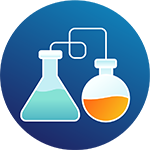
Biotechnology
Technology Comes Alive
Biotechnology covers many different scientific disciplines, including biochemistry, molecular biology, genetics, biomedical engineering, pharmacology, and microbiology, to name just a few. Biotechnology can also be divided into a wide range of sub-areas, including medical biotechnology (vaccines, antibiotics, antiviral, chemotherapeutics), agricultural biotechnology (selective breeding, genetically modified plants, biofuels), industrial biotechnology (fermentation, chemicals, textiles, food), and environmental biotechnology (bioremediation, wastewater treatment, soil conservation).[2]
Marine Biotechnology
Because the ocean is the greatest source of biodiversity on Earth, no ecosystem provides greater genetic diversity or possibilities for new products and processes.[3] Marine biotechnology is the creation of products and processes from marine organisms through the application of biotechnology, molecular and cell biology, and bioinformatics.[4] It is the field of science that deals with “ocean exploration for the development of new pharmaceutical drugs, chemical products, enzymes, and other products and processes. It also deals with the advancement of aquaculture and seafood safety, bioremediation, biofuels, among others.”[5] For example, a marine biotechnologist may work on increasing the yields of farmed fish, designing disease-resistant strains of oysters, or creating vaccines against certain viruses that can infect fish.[6] Given its profound effect on a vast number of industries and professions, marine biotechnology has the potential to harness the marine environment for human benefit and progress.[7]
Commerce and Science
Biotechnology is one of those fields of study (along with biomedical engineering and aquaculture) that fits neatly under both commerce and science. That is because while biotechnology is mainly about the business of developing new commercial products, that business is dependent on living organisms and, therefore, requires deep knowledge of biological, chemical, environmental, and molecular science. In fact, if you traced the beginnings of many successful biotech companies, you would see that many of the founders started as scientists in the laboratory and only after striking upon some new and innovative biotechnical process developed into businesspeople. Of course, that does not mean that business skills are not essential because they are, but it does mean that without the requisite background knowledge in science, it would be difficult to steer a biotech company towards success.
…
Citations
- What is Biotechnology?, University of Pennsylvania.
- What is Biotechnology?, Conserve Energy Future.
- Marine Biotechnology: An Overview. Indian Journal of Biotechnology 5 (2006).
- Marine Biotechnology: An Overview. Indian Journal of Biotechnology 5 (2006).
- Pocket K No. 52: Marine Biotechnology, International Service for the Acquisition of Agri-biotech Applications.
- Biotechnologist, Prospects.
- Pocket K No. 52: Marine Biotechnology, International Service for the Acquisition of Agri-biotech Applications.

The Path to Becoming a Biotechnologist
From High School to Your First Job
Build a Solid Academic Foundation
Basics:
Take all available STEM-related courses (chemistry, biology, physics, computer science, algebra, geometry, calculus) offered at your high school. Take all these classes at the most advanced level possible (honors, AP). This will help you build your knowledge base in scientific theory and concepts.
Recommended:
If not available at your high school, try and take biology-related (biochemistry, microbiology, genomics, molecular biology, marine biology), technology-related (artificial intelligence, machine learning, data science), and mathematics-related (probability and statistics) classes offered online.
Keep in Mind:
Get work experience through a research internship. Learn how to write for both a technical and non-technical audience. Experience with both oral and written scientific and technical communication are equally important. Spend time learning the basics, and the more complex concepts will follow naturally.
Dive In!
And become an expert
![]()
Peruse our library of must-read books
![]()
Thumb through a scientific publication
![]()
Take an online course
![]()
Watch an interesting video
![]()
Check out these great websites
Get a

jump on your Academic career
There’s no substitute for experience.
We have compiled a database of thousands of internships, research opportunities, academic programs and specialized training programs so you can get a jump on your academic career.
Internships
Research
Academic Training Programs
And if you need support to fulfill your dreams and ambitions, our searchable database has plenty of scholarship opportunities as well as programs designed to increase diversity in the sciences.
Scholarships
Diversity, Equity & Inclusion
Need Help Finding Your Opportunity?
Our video tutorials explain the ins and outs of landing a great internship, research project or training program.
Make all the right moves
Advice from those who know
Maintain an excellent GPA, especially in the sciences
Have work experience on your resume
Obtain lab experience and become familiar with lab instrumentation
Attend professional conferences and biotechnology seminars
Build experience through internships in private industry or government
Join professional societies and organizations
Stay current by reading professional journals
Learn about current research projects
What degree is right for you?

Bachelor’s Degree
A bachelor’s degree is the minimum requirement to work in the field of biotechnology, but advancement is limited. If you do not attend a school with a specific biotechnology major, you should obtain a degree in a constituent area (molecular biology, microbiology, biochemistry, chemical engineering, or physics). Familiarity with lab techniques and the use of scientific instrumentation is an essential requirement for most positions.
Master’s Degree
A master’s degree is recommended as this is where, depending on the program, you will be able to pursue a specialization in biotechnology. In addition to learning theory and practice, you should be able to demonstrate mastery of state-of-the-art biotechnology applications, processes, and techniques in diverse areas, including research and development and production of high-tech products. This will allow you to start employment at a more advanced level.
Doctorate
A doctoral degree and, most likely, post-doctoral studies are required if you want to have a career in academia. Senior positions with pharmaceutical companies, chemical companies, biotechnology companies, genetic engineering companies, government and private hospitals, agricultural companies, food and beverage companies, and private research facilities may require that you have a doctoral degree. This is also true for high-level positions with governmental, non-governmental, and nonprofit organizations.
10 Schools With Excellent Biotechnology Programs
Want to see the full list of colleges and universities with degree offerings or relevant courses?
Biotechnology
Tufts University
Biotechnology
University of California, Davis
Biotechnology
Rutgers, The State University of New Jersey
Biotechnology
James Madison University
Applied Biotechnology
Auburn University
Biotechnology
Syracuse University
Biotechnology
University of Kansas
Biotechnology Enterprise, Certificate
Johns Hopkins University
Biotechnology
Northeastern University
Biotechnology
New York Institute of Technology
![]()
Tip 1
Since biotechnology is not typically offered as an undergraduate major, look for programs in molecular biology, biochemistry or cellular biology and then supplement that knowledge through internships or work experience.
![]()
Tip 2
The ability to work well as part of a group is essential at all degree levels. Supervisory and project management skills become much more important as your degree level increases, so try and obtain relevant work or internship experience.
![]()
Tip 3
Given that innovation in biotechnology is often on the cutting edge of science (genetic engineering, cloning) and society (investing in neglected diseases, pricing of medicines), you should take courses in bioethics, medical humanities, and law.
Have familiarity with one or more of the following areas

Systems and statistical modeling

Big data and analytics

Ethics

Science communication

Experimental design and research techniques

Bioinformatics

Use and maintenance of lab equipment

Laboratory safety

Big data

Biological Sciences
Typical Job Functions of a Biotechnologist
Here are some of the interesting things you could be doing.
Designing and implementing research studies.
Identifying how your research can be applied to improving different aspects of human life.
Developing, conducting, and monitoring experiments using live organisms or biomolecular processes.
Collecting specimens, analyzing data, and preparing reports.
Monitoring health, safety, and environmental regulations.
Staying current with new advances in biotechnology to develop new techniques, products, or practices.
Setting up and maintaining laboratory equipment and technology.
There’s an Ocean of Possibilities
A career in biotechnology gives you a lot of options. The top fields are medicine, agriculture, energy, and the environment. Positions are usually referred to by what particular field in which you may be working.
Common fields include:
- Bioinformatics
- Biodefense
- Biomedical
- Biochemical
- Cancer biology
- Genetics
- Molecular Biology
- Pharmacology
- Stem Cell Research
- Virology
Common employers include:
- Pharmaceutical Companies
- Chemical Companies
- Life Sciences Companies
- Genetic Engineering Companies
- Universities and Research Institutions
- Government and Private Hospitals
- Agricultural Companies
- Food Manufacturers
- Beverage Manufacturers
- Environmental and Conservation Consulting Companies
Start your career search with our extensive list of employment websites.
